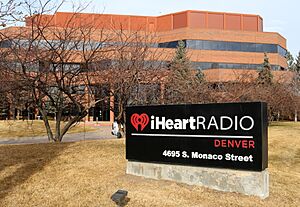- This page was last modified on 17 October 2025, at 10:18. Suggest an edit.
iHeartMedia facts for kids
 |
|
|
Formerly
|
|
|---|---|
| Public | |
| Traded as | NASDAQ: IHRT (Class A Common Stock) |
| Industry |
|
| Founded |
|
| Founders |
|
| Headquarters |
,
U.S.
|
|
Key people
|
Bob Pittman (chairman and CEO) Rich Bressler (President, Chief Operating Officer and Chief Financial Officer; CEO, Multiplatform Group) Conal Byrne (CEO, Digital Audio Group) |
|
Operating income
|
|
| Total assets | |
| Total equity | |
|
Number of employees
|
10,800 |
| Divisions | iHeartMedia (sans "Inc." suffix; formerly Clear Channel Media and Entertainment, Clear Channel Radio, et al.) |
| Subsidiaries |
|
iHeartMedia, Inc. is a big American company that focuses on mass media. Its main office is in San Antonio, Texas. It is the main company for iHeartCommunications, Inc., which used to be called Clear Channel Communications, Inc.. This company was started in 1972 by Lowry Mays and Red McCombs.
In 2014, CC Media Holdings, Inc. changed its name to iHeartMedia, Inc. At the same time, Clear Channel Communications, Inc. became iHeartCommunications, Inc. This change showed the company's new focus on digital media.
What iHeartMedia Does
iHeartMedia, Inc. is a leader in radio broadcasting, podcasting, and digital content. They also put on live events. The company owns more than 870 AM and FM radio stations in the U.S. This makes it the largest owner of radio stations in the country.
The company is also very active in internet radio and podcasting. They do this through their digital platform called iHeartRadio. The company's current name, iHeartMedia, comes from this popular platform. In the past, the company was also involved in live events and outdoor advertising. They later separated these businesses into other companies like Live Nation Entertainment and Clear Channel Outdoor.
Company History
How it Started (20th Century)
Clear Channel Communications bought its first FM radio station in San Antonio, Texas in 1972. They bought another important AM station, WOAI, in 1975. By 1976, they started buying stations outside of San Antonio.
In 1992, the rules about how many radio stations one company could own became a bit more flexible. This allowed Clear Channel to buy more stations. By 1995, the company owned 43 radio stations and 16 television stations. When the Telecommunications Act of 1996 was passed, it made media ownership rules even more open. Clear Channel then bought many more media companies and stations.
Sometimes, after buying a competitor, Clear Channel had to sell some stations. This happened if they owned too many stations in certain cities. In 1997, Clear Channel also expanded into outdoor advertising by buying Eller Media. They also started buying companies outside the U.S., like More Group plc in the UK in 1998.
In 1999, the company bought Jacor Communications, another radio company. They also invested in the new satellite radio service, XM Satellite Radio. This gave them the right to create some stations for XM.
Growing and Changing (21st Century)
In 2000, Clear Channel bought SFX Entertainment, a company that organized concerts. In 2005, Clear Channel separated its live events business, which became Live Nation.
In 2006, Clear Channel announced plans to become a private company. Two investment firms, Thomas H. Lee Partners and Bain Capital Partners, bought the company for a large sum of money. As part of this deal, Clear Channel planned to sell all its television stations and many smaller radio stations. The television stations were sold in 2007.
The company faced some financial challenges in the following years. In 2009, they had to lay off many employees due to tough economic conditions and debt. In 2010, MTV co-founder Robert W. "Bob" Pittman joined the company and later became its CEO.
In 2014, Clear Channel Communications changed its name to iHeartMedia. This new name came from their popular iHeartRadio platform. The change showed that the company was focusing more on digital media and internet radio. The old name, "Clear Channel," came from a type of AM radio station that has a clear frequency at night. CEO Bob Pittman said the company was doing "progressive stuff" but still had a name linked to old AM radio.
iHeartMedia faced a lot of debt from its earlier buyout. In March 2018, the company filed for Chapter 11 bankruptcy. This allowed them to reorganize their debt. They reached an agreement to reduce their debt by a large amount.
In September 2018, iHeartMedia bought HowStuffWorks' podcast network. In January 2019, a court approved a plan for iHeartMedia to leave bankruptcy. This plan also included separating its outdoor advertising division, Clear Channel Outdoor. iHeartMedia officially came out of bankruptcy in May 2019. They kept their leaders, Bob Pittman and Rich Bressler.
In January 2020, iHeartMedia made big changes to how it was organized. This was to "modernize" the company and use new technology better. These changes led to some layoffs, but they aimed to improve the experience for listeners and business partners.
What iHeartMedia Owns
iHeartMedia has bought many companies in media and advertising. Here are some of their main businesses:
Radio Stations

iHeartRadio's offices and studios in Denver, which houses KTCL, KDHT, KBCO, KRFX, KOA, KBPI, KHOW, KDFD, and KWBL
With 855 stations, iHeartMedia is the biggest owner of radio stations in the United States. They reach over 110 million listeners every week. In 2012, the company started a new way to pay performance royalties directly to music labels and artists. This means artists get paid when their songs are played on the radio.
Radio Companies Bought
iHeartMedia has bought many radio companies over the years, including:
- AMFM Inc.
- Jacor
- Metro Networks
- Paxson Communications
- XM Satellite Radio (for service and programming)
Outdoor Advertising

Billboards at Yonge-Dundas Square in Toronto, owned by Clear Channel, in 2005
Clear Channel Outdoor (CCO) is an advertising company that used to be part of iHeartMedia. In May 2019, it became a separate company when iHeartMedia left bankruptcy.
Television Stations (Former)
Clear Channel Television was a television broadcasting company that operated from 1988 to 2008. It owned more than 40 TV stations. The first TV station Clear Channel bought was WPMI-TV in Mobile in 1988. Over time, Clear Channel Television became one of the largest independent TV groups.
In 2007, the company agreed to sell all its television stations. The deal was completed in March 2008. These stations were then owned by Newport Television, which later sold them to other TV groups.
Music Charts
iHeartMedia owns Mediabase. This company provides music charts that show which songs are played the most on radio stations in the U.S. and Canada. Many of the stations that report to Mediabase are iHeartMedia's own stations.
News and Information
iHeartMedia also has several news and information services:
- 24/7 News Source: Provides news updates around the clock.
- iHeartRadio News Network: Offers local news networks in many U.S. states.
- Premiere Networks: A major company that distributes radio shows.
- Total Traffic & Weather Network: Gives reports on traffic and weather conditions across the U.S. and in Mexico City. These reports are used by many GPS navigation systems.
- Fan Radio Network: A sports radio network for Minnesota and the Dakotas.
- Your Smooth Jazz: A 24-hour smooth jazz music network.
Around the World
iHeartMedia owns outdoor advertising companies in many countries, including Brazil, France, Italy, and the United Kingdom.
Bicycle Rental Systems
The company also operates bicycle sharing systems in several European cities. These systems allow people to rent bikes for short trips. Some cities with these systems include:
| City | Country | System name |
|---|---|---|
| Caen | ||
| Dijon | ||
| Rennes | ||
| Oslo | Oslo Bysykkel | |
| Barcelona | Bicing | |
| Stockholm | City bikes | |
| Milan | bikeMi | |
| Antwerp | Velo Antwerpen |
Broadcast Towers
iHeartMedia owns and runs about 1,500 broadcast towers across the U.S. Other companies, like cellular providers, can also use space on these towers.
Radio Programming
iHeartMedia runs the country's largest radio show syndication service, Premiere Networks. This means they distribute many radio shows to stations across the country. They also have their own shows that they share with stations.
iHeartRadio Platform
iHeartRadio is a free platform for broadcast, podcast, and streaming radio. It brings together over 860 local iHeartMedia radio stations and hundreds of other stations.
Music Station Types
iHeartMedia has many different types of music stations:
- Alternative Stations: Often called "Radio" or "ALT" (like Alt 98.7 in Los Angeles).
- Hip-hop, Rap, R&B, and Rhythmic Stations: These stations play music popular with black Americans. They are often branded as "Real" (like KRRL Los Angeles), "Beat" (like KQBT Houston), or "Power" (like WWPR-FM New York City).
- Smooth Jazz: These stations play smooth jazz music all day.
- Dance and EDM: While they don't have many full-power stations for this, they have digital platforms like Evolution for Electronic Dance Music (EDM).
- Adult Contemporary (AC): These stations often play softer pop music and are branded as "Lite FM" (like WLTW New York) or "Sunny" (like KODA Houston). Many play Christmas music during November and December.
- Contemporary Hit Radio (CHR): These are pop music stations, often called "KISS-FM" (like KIIS-FM Los Angeles) or "Z" (like WHTZ New York).
- Country Music: Country stations are often branded as "The Bull" (like WUBL Atlanta) or "Big" (like WSIX-FM Nashville). They often feature popular syndicated shows.
- Classic Hits/Oldies: These stations play popular songs from the 1970s, 80s, and 90s.
- Rock: Rock stations play a mix of new and classic rock. Many are called "The Fox" or "The Brew."
- Spanish: In some areas, iHeartMedia has FM stations that play Hispanic music, including Contemporary Tropical or Mexican formats.
- Religious: In a few places, iHeartMedia has AM stations that play religious programming or Gospel music.
Talk Radio Stations
iHeartMedia also owns many talk radio stations:
- News/Talk Stations: These stations often have local morning shows and then play syndicated shows like The Glenn Beck Radio Program or The Sean Hannity Show. Many of these AM stations are also broadcast on FM stations to reach more listeners.
- All-News: In some cities, like Boston, iHeartMedia has stations that broadcast news continuously.
- Black Information Network (BIN): Launched in 2020, BIN is an all-news radio brand specifically for African Americans.
- Sports Talk Stations: Most of iHeartMedia's sports talk stations are connected with Fox Sports Radio.
See also
- iHeartMedia radio stations
- Clear Channel UK
- List of radio stations owned by iHeartMedia
- List of songs deemed inappropriate by Clear Channel following the September 11, 2001 attacks
- TuneIn
